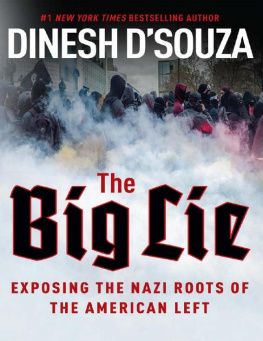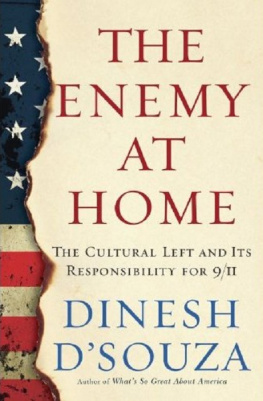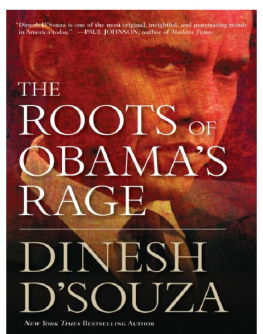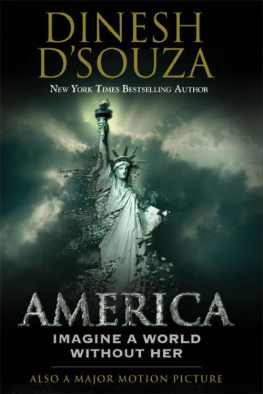Visit Tyndale online at www.tyndale.com.
TYNDALE and Tyndales quill logo are registered trademarks of Tyndale House Publishers, Inc.
Godforsaken: Bad things happen. Is there a God who cares? Yes. Heres proof.
Copyright 2012 by Dinesh DSouza. All rights reserved.
Author photo copyright 2010 by Dixie DSouza. All rights reserved.
Designed by Jessie McGrath
Unless otherwise indicated, all Scripture quotations are taken from the Holy Bible , New Living Translation, copyright 1996, 2004, 2007 by Tyndale House Foundation. Used by permission of Tyndale House Publishers, Inc., Carol Stream, Illinois 60188. All rights reserved.
Scripture quotations marked NIV and in the epigraph are taken from the Holy Bible, New International Version , NIV . Copyright 1973, 1978, 1984, 2011 by Biblica, Inc. Used by permission of Zondervan. All rights reserved worldwide. www.zondervan.com.
Scripture quotations marked KJV are taken from the Holy Bible , King James Version.
Library of Congress Cataloging-in-Publication Data
DSouza, Dinesh, date.
Godforsaken : Bad things happen. Is there a God who cares? Yes. Heres proof. /
Dinesh DSouza.
pages cm
Includes bibliographical references.
ISBN 978-1-4143-2485-2 (hc)
1. SufferingReligious aspectsChristianity. 2. God (Christianity)Goodness. 3. Christian life. I. Title.
BV4909.D84 2012
231.8dc23 2011049946
For Lee and Allie Hanley,
whose love of our country
and our Lord
is a great inspiration to me
My God, my God, why have you forsaken me?
PSALM 22:1
Part 1
Introduction
Chapter 1
An Immigrants Journey
The Paradox of Suffering
That to the height of this great argument
I may assert Eternal Providence,
And justify the ways of God to men.
JOHN MILTON , Paradise Lost
Each one of us, at some point in our lives, will find ourselves staring death in the face. None of us can escape that grim reality. Recently, I was reminded of that reality while reading the following e-mail from my friend, Devdas Kamath, who went to school with me in India but with whom I had lost contact over the years.
My elder son Nikhil, a first year student at the Indian Institute of Management, Ahmedabad, died of a rare disorder, Thrombotic Thrombocytopenic Purpura (TTP), at Ahmedabad on Tuesday, September 29. On Monday, September 21, Nikhil complained of fever. Since the fever did not subside with Crocin, he visited the doctor. He did not respond to the doctors treatment. Hence he was referred to a senior physician on Friday, September 25. He appeared to improve a bit by the same night. The next day, however, his condition had worsened, and he was admitted to SAL Hospital. At that time, I was in Mumbai. I managed to reach SAL Hospital around 7 p.m., while my wife Surekha reached from Chennai around 11 p.m. After a series of blood tests, the doctors concluded that Nikhil had contracted Thrombotic Thrombocytopenic Purpura, a blood disorder which causes blood in small vessels in the body to clot. The clots hamper the flow of blood to key organs. This leads to rapid deterioration and multiple organ failure. By the time the diagnosis was made, Nikhils condition had seriously deteriorated. He died around 7:20 p.m. on Tuesday, September 29.
I read the e-mail, and I burst into tears. To be honest, I didnt even know why I was crying. Devdas was my best friend in high school, but I hadnt been in touch with him since I came to America three decades ago. Obviously, I had never met his son. As the tears ran down my face, I felt almost embarrassed. Acutely I felt the contrast between Devdass stoic report of his sons death and my seemingly excessive reaction to it. As I thought about it, I realized I wasnt crying for the young man, but for his father. I was crying for my friends loss. And it came to me with a shock of discovery that I realized how much I loved this guy. Life had intervened since high school in such a way that I hadnt thought about him in years, yet the hurt I now felt over his loss was a measure of what, deep down, I truly felt about him. Since then we have restored our friendship, at least to the degree possible over a long distance. Remarkably, it was the death in his family that proved to be the catalyst for that restorationthough obviously neither of us would have chosen the suffering.
Suffering is the theme of this book, and it is one that I have been thinking about my whole life, though mine has been a happy life. I grew up in a suburb of Bombaynow called Mumbaiand when I was nine years old, my grandfather died. I remember my grandmothers expression as she returned from the hospital. It was a defeated look, confirming the magnitude of her loss, and yet it was also defiant, as if she would not allow even this to break her dignity. I think this memory stands out for me, not because it was so painful, but because my life was so problem free that death came into it almost as an impostor, a misfit. Thats when I began noticing death lurking about, along with its siblings tragedy and suffering.
When I was about thirteen, a group of us went to the beach near my house, not a sand beach but the rocky entrance to the Arabian Sea. As we explored the crevices and small pools leading down to the ocean, one of my friends yelled out. He had spotted a tiny infant, probably only a few days old, floating faceup in the water. Whereas in America our first thought might have been foul play or an accident, as youths in India we had no doubt in our minds that some desperate mother had drowned her child to escape the shame of having him out of wedlock. We stared at the little corpse in horrid fascination, and then we turned and ran away. To this day I wonder occasionally about that young mother, how she must have felt to be driven to do that, and how as a consequence a little life was extinguished even before it had its chance.
I wasnt a complete stranger to suffering as a childin India I was, after all, surrounded by people who lived on just a few rupees a daybut somehow it didnt make a strong impression. I suppose thats because I was just as likely to see the poor people around me smiling, or even hear them roar with laughter, as I was to encounter their groans and tears. The poor in India take life as it comes, and they seem content to wring whatever happiness they can even out of difficult circumstances. Ive often wondered why this is so. I think its because when you have very little, you typically dont compare yourself to the rich, but to those around you, and you find that by this measure, there is not very much to complain about.
Back then, the person I knew who had suffered the most was undoubtedly my grandfather. That man had stories, and he told them with such gusto that you almost missed the horrific aspect of those life experiences. Never one to dwell on the negative, he only told me his life story once, at my grandmothers insistence.
My grandfather worked in Burmanow called Myanmarin the 1940s, and when the Japanese invaded the country, he and his family were forced to evacuate. Only women and children were allowed to take the boat, however; the men all had to walk. Walking, in this case, meant going on foot from Burma to India, a distance of hundreds of miles. Some of it was over mountains and across rivers and through malaria-infested jungle. As he described it, there were corpses all along the way. Sometimes the refugees would come upon a massive current, and some were not brave enough to attempt to cross it, so they would just stop and stay put and die.












